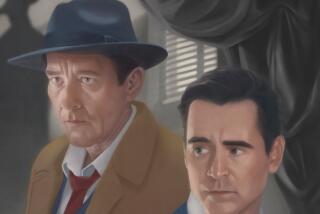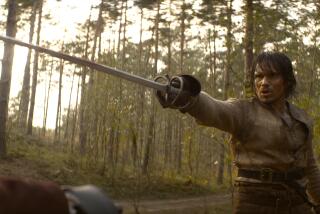MOVIE REVIEW : Pace Drains Intrigue From ‘La Maison’
- Share via
“La Maison Assassinee” (at the Fine Arts) begins excitingly. On a pitch dark night in 1896 a person or persons unknown slaughter the inhabitants of a remote stone inn, leaving only a baby alive. World War I then unfolds behind the film’s opening credits via newsreel clips; by the time the credits are over it’s 1920, and we see a young soldier (Patrick Bruel) arriving in a small village near that inn. He only knows that he’s an orphan; that he’s the infant that survived the massacre of his parents, two brothers and grandfather is just the first of the shocks he’s to receive.
Essentially, “La Maison Assassinee” is a murder mystery as intricately plotted as those of Agatha Christie. Fondly remembered for providing Rita Hayworth with one of her finest serious roles in the 1970 “Road to Salina,” veteran French director Georges Lautner, however, takes the 1984 Pierre Magnan novel upon which the film is based all too seriously. His film is handsomely produced and decently acted, but he and his co-adapter, Jacky Cukier, and dialogue writer Didier Van Cauwelaert let the film get much too talky. Fortunately, it regains momentum for a strong finish, but the middle sags tediously. “La Maison Assassinee” cries out for the passion and energy of Bertrand Tavernier and the darkly humorous sense of the perverse of Claude Chabrol. As it is, the film does leave us with a sense of wonder at the twists and turns of fate when it interacts with the foibles of human nature.
Early on, Bruel is pretty sure that the three foreign railroad workers who were guillotined for the murder of his family were innocent, especially when he stumbles upon documents that provide strong motivation for three local men. By and large the villagers regard Bruel with guilt, fear and suspicion, further resenting that he of all people is the only young man from the town to return from the war alive. Pretty soon dire, mysterious events commence, fomenting intimations of the supernatural and talk of curses.
A popular singer in France in only his second film, Bruel excels in a highly introspective, largely reactive role. “La Maison Assassinee” (Times-rated Mature for adult themes, violence) is probably distinctive enough in content if not form to inspire lovers of French films to forgive it for not being better than it is, but it’s surely not sturdy enough to appeal to wider audiences.
‘La Maison Assassinee’
Patrick Bruel Seraphin Monge
Anne Brochet Marie Dormeur
Agnes Blanchot Rose Pujol
Ingrid Held Charmaine Dupin
A CineQuaNon release. Director Georges Lautner. Producer Alain Poire. Screenplay: adaptation by Lautner and Jacky Cukier; dialogue by Didier Van Cauwelaert; based on a novel by Pierre Magnan. Cinematographer Yves Rodallec. Editor Michelle David. Costumes Manka Guezel. Music Philippe Sarde. Art director Chantal Giullani. Set decorator Jacques DuGied. Sound Main LaChassagne. In French, with English subtitles. Running time: 1 hour, 49 minutes.
Times-rated Mature (for adult themes, some violence).
More to Read
Only good movies
Get the Indie Focus newsletter, Mark Olsen's weekly guide to the world of cinema.
You may occasionally receive promotional content from the Los Angeles Times.










